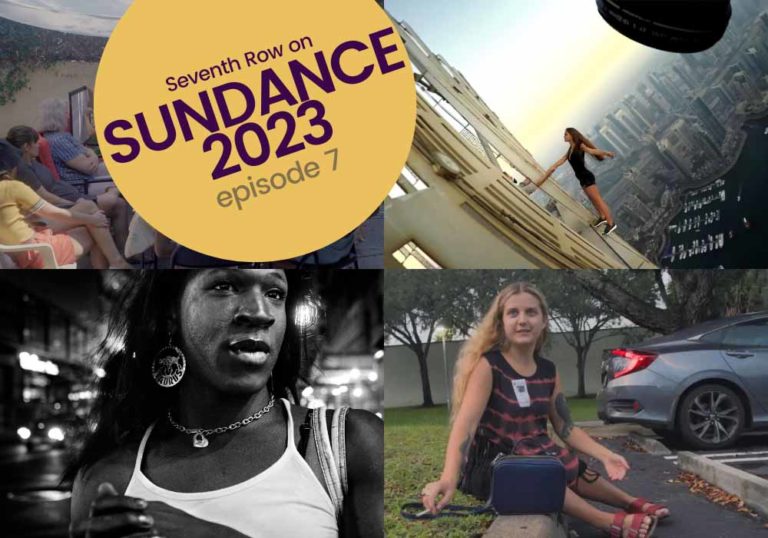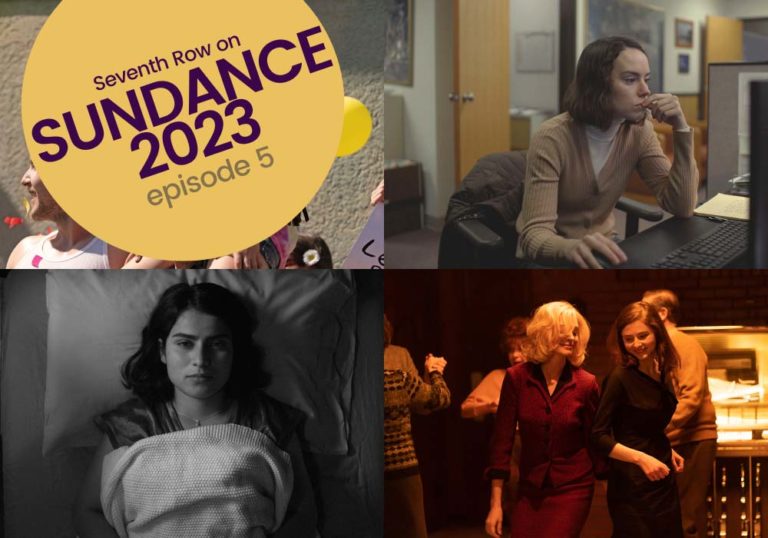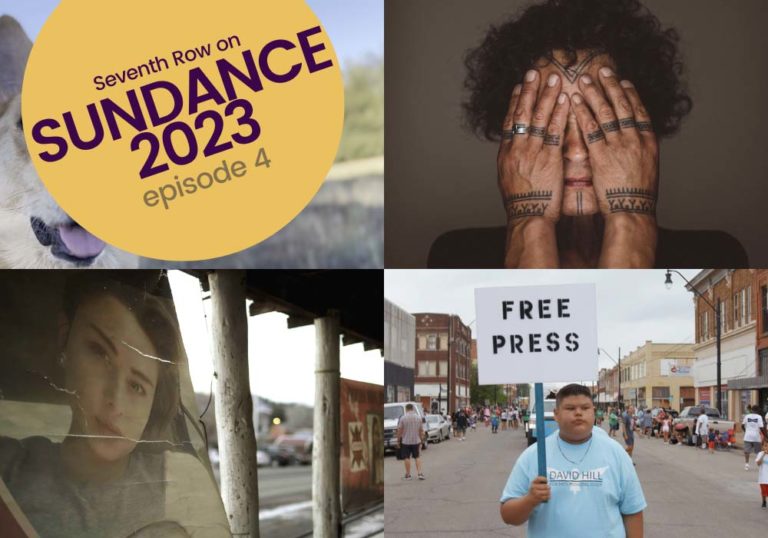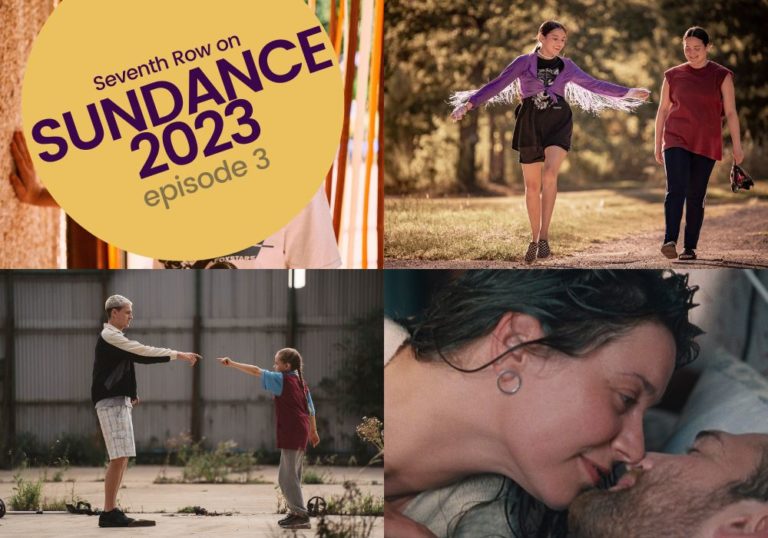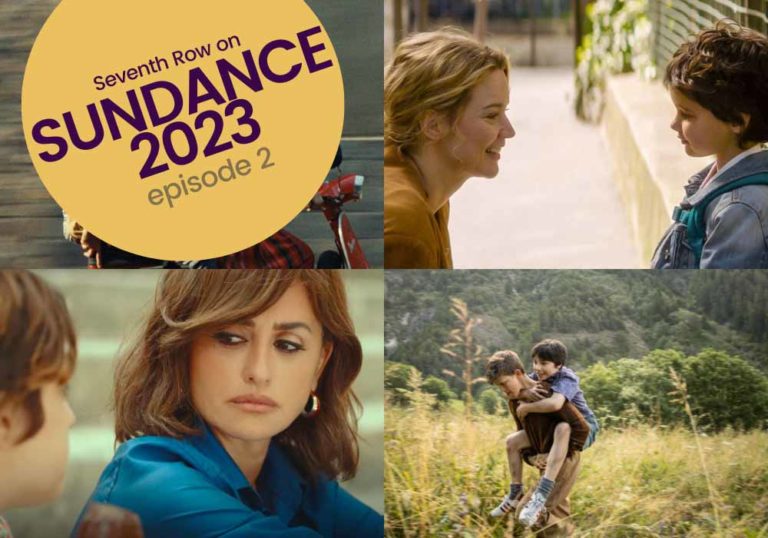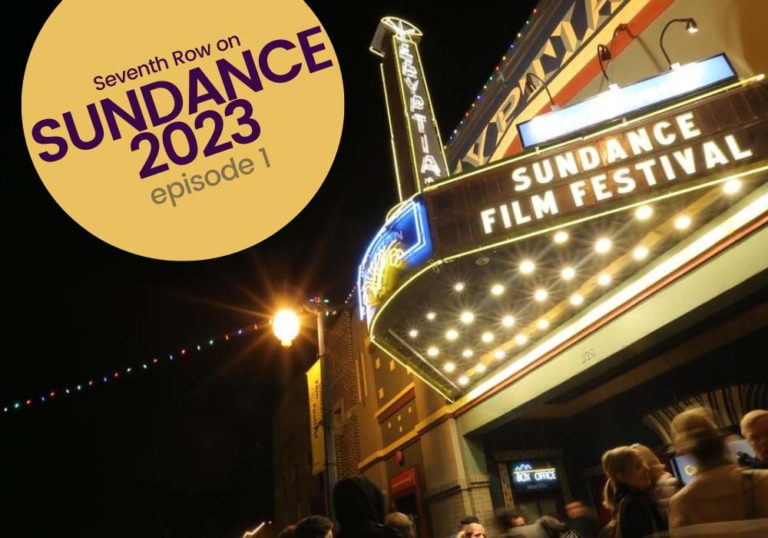In the sixth episode (and third dispatch) of the Sundance 2023 podcast season, we discuss highlights like Ira Sachs’s film Passages, Nicole Holofcener’s film You Hurt My Feelings, Sebastián Silva’s Rotting in the Sun, and Angus MacLachlan’s A Little Prayer, as well as other buzzed-about films at the festival.
Don’t miss a single episode. Subscribe to the podcast now.
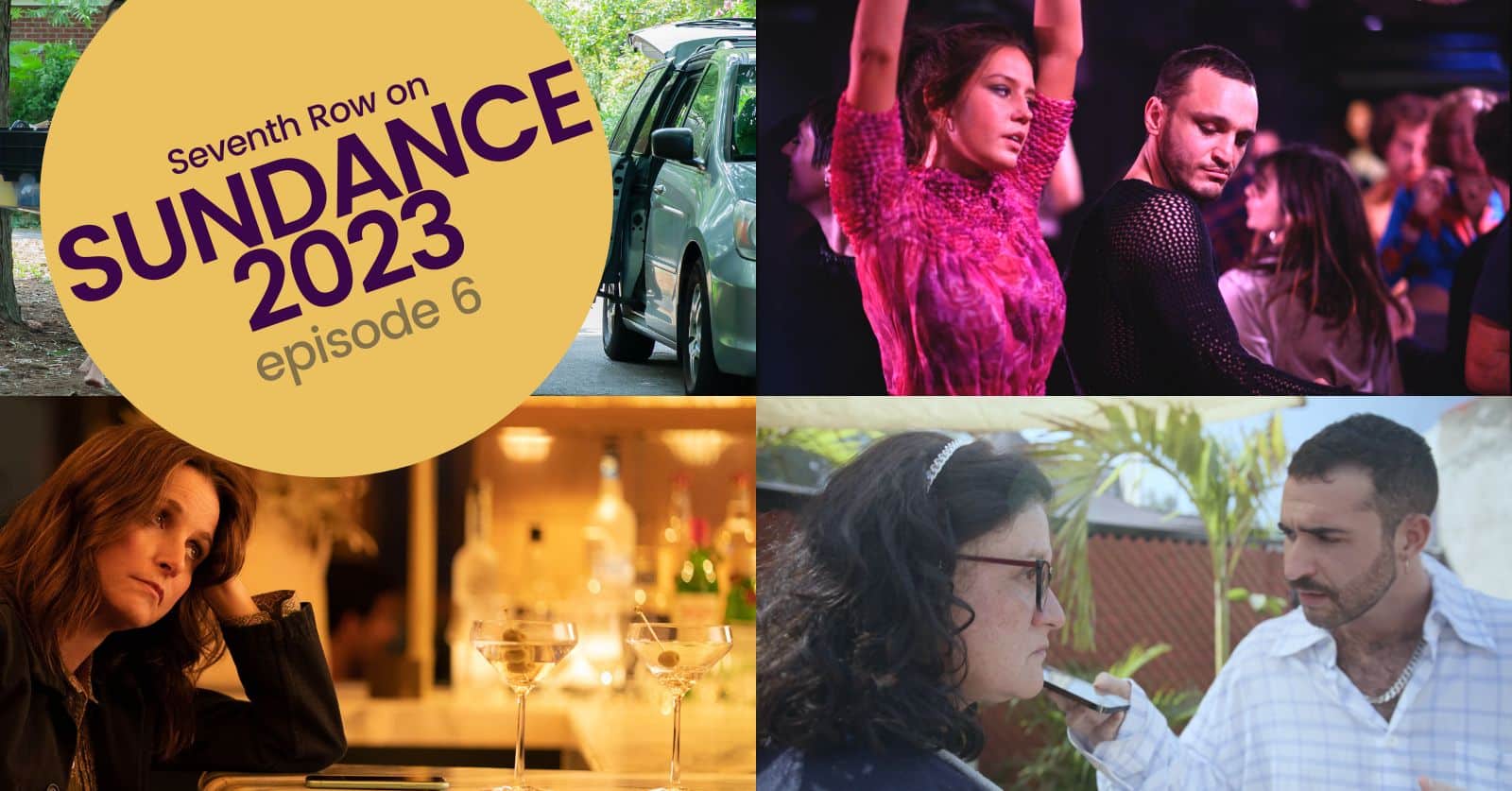

Listen to the whole Sundance 2023 season
Today is the sixth of seven episodes of the 2023 Sundance season of the Seventh Row podcast.
Sundance 2023 ran from January 19-28, and we have covered this year’s festival in a new podcast season about the films this year and how the programming fits into the festival’s history.
Listen to all the episodes to discover the year’s best and worst films, and how this year’s program jives with past festivals.
About this episode: Sundance 2023 highlights like the films You Hurt My Feelings, Rotting in the Sun, Passages, A Little Prayer, and more buzzed-about films
- 00:00 Introduction
- 01:10 Brief thoughts on Fremont, Infinity Pool, Bad Behaviour, Rye Lane, Drift, A Thousand and One
- 39:20 You Hurt My Feelings by Nicole Holofcener
- 52:04 Rotting in the Sun by Sebastián Silva
- 1:04:22 Passages by Ira Sachs
- 1:21:55 A Little Prayer by Angus MacLachlan
- 1:33:30 Fair Play, Cat Person, and the legacy of Promising Young Woman
- 1:54:49 Sundance bingo
In this episode, we discuss four of our favourite films of Sundance 2023, each in the Premieres section: Nicole Holofcener’s dreamed, You Hurt My Feelings, Sebastián Silva’s black comedy Rotting in the Sun, Ira Sachs’ relationship drama Passages, and Angus MacLachlan’s quietly insightful family drama. We also talk briefly about the disappointing films that have forged themselves in the image of Promising Young Woman: Fair Play and Cat Person. Orla discusses one of her most hated films of the festival, Infinity Pool, and Alex defends Alice Englert’s troubled feature debut Bad Behaviour. Alex also adds her thoughts on Fremont, which Orla first discussed in episode 3 (Alex agrees it’s excellent).
Finally, we both discuss some minor highlights of the festival. We were underwhelmed by British rom-com Rye Lane, though think it’s a good depiction of the city. Alex liked Anthony Chen’s (Ilo Ilo and Wet Season) English-language debut Drift, starring Cynthia Erivo and Alia Shawkat, despite its problematic script, because the direction and performances were so good (Honor Swinton-Byrne also shows up!). Orla also weighs in on the US Grand Jury Prize Winner One Thousand Nights.
When/where will you be able to watch the films?
Infinity Pool is currently in cinemas in Canada and the US. Mubi has picked up worldwide rights to Passages, which it will likely release later this year. Sony Pictures Classics (and Mongrel Media in Canada) has picked up the US rights for the film A Little Prayer. We expect a fall release with some fall festival play, and perhaps an Oscar campaign for David Strathairn. A24 already had the rights to Nicole Holofcener’s film You Hurt My Feelings, which we expect will likely be a summer release in the US and Canada. Netflix paid 20 million dollars for Fair Play, which given the positive response at the festival (even if we thought it was bad) will likely mean a fall release. Focus Features has the rights to A Thousand and One which we now expect to be Oscar campaigned with a fall release.
Never miss an episode again. Become a member.
The Seventh Row Podcast spotlights under-the-radar, female-directed, and foreign films. All of our episodes are carefully curated. Indeed, we only discuss films we think are really worth your time and deserve in-depth critical analysis.
Our episodes that are more than six months old are only available to members. In addition, many of our new episodes are for members only.
For exclusive access to all of our episodes, including all of our in-between season episodes, become a member.
How to follow our Sundance 2023 coverage
Subscribe to our newsletter for updates on the 2023 Sundance podcast season and coverage on the website.
Follow Seventh Row on Twitter and Instagram @SeventhRow; Alex Heeney on Twitter and Instagram @bwestcineaste; and Orla Smith on Twitter and Instagram.
Show Notes on the E6 of the Sundance 2023 podcast season: Passages, You Hurt My Feelings, Rotting in the Sun, A Little Prayer, and more
- Read Indiewire’s article on the making of Rotting in the Sun, which we quote from in this episode.
- Read our interview with Sebastián Silva on his film Magic Magic
- Treat yourself by following Franz Rogowski on Instagram.
- Read our profile of Geraldine Viswanathan, who was wasted by Cat Person.
- Read Kristen Roupenian’s original Cat Person short story, published by The New Yorker.
- Listen to episode three of our Sundance 2023 podcast season, in which we discuss Slow, which features a far better example of asexual representation than Cat Person.
- Read our interview with Ana Katz, the director of The Dog Who Wouldn’t Be Quiet, which was our favourite film of Sundance 2021.
- Download the Sundance 2023 bingo card to follow along at home.
- Listen to our last podcast season, which tackles the history of women at the Cannes film festival, and read our comprehensive list of all the women filmmakers who have been programmed by Cannes.
Related episodes to films discussed in E6, including Passages, You Hurt My Feelings, Rotting in the Sun, A Little Prayer, and more
All of our podcasts that are more than six months old are only available to members. We also regularly release members only bonus episodes. Many of the episodes listed here are now only available to members (Members Only).
Discover all of our past podcast episodes on films that screened at Sundance.
Episodes related to the Franz Rogowski in the film Passages
- Ep. 5: Christian Petzold’s Transit (MEMBERS ONLY): Franz Rogowski, who stars in the film Passages, is one of the best actors working today. Head back to one of our earliest episodes where we discuss his amazing (best of the decade) performance in one of the best films of the decade.
- Ep. 119: Mike Leigh’s Naked (FREE — soon becoming MEMBERS ONLY): There are very few good cinematic depictions of narcissists. Ira Sachs’s Passages is the latest entry into the canon, and the narcissist at its centre, played by Franz Rogowski, reminded us of Johnny (David Thewlis) from Mike Leigh’s Naked, if much less sympathetic (and yet less abusive).
Episodes about Ben Whishaw, co-star of Passages
- Ep. 69: Paddington and Paddington 2 (MEMBERS ONLY): Ben Whishaw was at Sundance this year with two new movies: Alice Englert’s film Bad Behaviour (as a cult leader) and Ira Sachs’s film Passages (as a man married to Franz Rogowski who cheats on him with a woman). We celebrated Whishaw’s work in both Paddington films, and his prowess as an actor more generally, in this discussion that concludes Paddington is the ultimate symbol of British colonialism.
- Bonus ep. 25: This is Going to Hurt (MEMBERS ONLY): Ben Whishaw is one of the very best working actors today. With two films at Sundance coming out later this year (hopefully!), now is a great time to visit his tour de force career best work as the lead of This is Going To Hurt, a show about physician mental health in the NHS. His performance is both comic and dramatic and absolutely heartbreaking. It’s also so incredibly detailed. Nobody else could do it like him.
Related episodes to the films A Little Prayer, Rotting in the Sun, and You Hurt My Feelings.
- Ep. 40: Remembering dead mothers in Stories We Tell, Louder Than Bombs, and Mouthpiece (MEMBERS ONLY): A Little Prayer is a film very much about the family as an ecosystem and a unit of people trying their best under difficult circumstances and often screwing. That’s also what Joachim Trier’s Louder Than Bombs (2015) is about, and we discuss it in depth in this episode. Louder Than Bombs is also about what happens to a family when a major secret has been kept and comes out, wreaking some havoc, just as in the film You Hurt My Feelings.
- Ep. 94: HBO’s Looking (MEMBERS ONLY): It’s not often that we get media that is unabashedly gay, depicting gay spaces and the gay community in a way that might make heterosexuals uncomfortable. HBO’s Looking was pioneer for this on TV, including the way it depicted gay sex and intimacy. Sebastián Silva’s Rotting in the Sun also pushes the envelope, though in a much more confronting (and depressing) way.
Related episodes to Cat Person and Fair Play
- Ep. 73: Explorations of rape culture in Promising Young Woman and The Assistant (MEMBERS ONLY): Fair Play and Cat Person at Sundance this year feel like poor attempts to ride the Promising Young Woman hype. Revisit our original bashing of Promising Young Woman for context about why we think its approach to addressing sexual assault is really problematic. We compare it to The Assistant which was way better and also screened at Sundance that year, a much subtler and smarter approach to the topic.
- Bonus ep. 16: Watching Lena Dunham’s Girls in 2021 (MEMBERS ONLY): Lena Dunham was a pioneer of uncomfortable sex scenes involving women in the their 20s, and films like Promising Young Woman, Cat Person, and Fair Play have picked up the baton (if not reached Dunham’s heights). In this episode, we discussed what it was like to watch Girls in 2021 (for the first time for Orla).
Listen to all the related episodes. Become a member.
For exclusive access to all of our episodes, including all of our in-between season episodes:
Speakers on this episode
Host Alex Heeney is the Editor-in-Chief of Seventh Row. Find her on Twitter @bwestcineaste.
Host Orla Smith is the Executive Editor of Seventh Row. Find her on Instagram @orla_p_smith.
Episode transcript
The transcript for the free excerpt of this episode was AI-generated by Otter.ai.
[fusebox_transcript]
